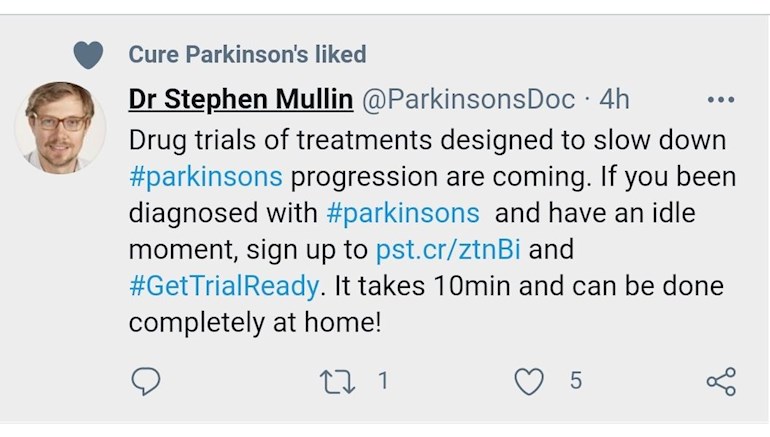Drug trials to slow down the Disease - Cure Parkinson's
Drug trials to slow down the Disease

What is the highest dose recomended for PD??
UK only
Bydureon (a.k.a., Exenatide), a repurposed Type 2 Diabetes drug is now in third-stage trials in UK for stopping Parkinson’s in its tracks — results expected 2023. Testing — mice, open label, double blind — has been going on since 2010 and it has been positive every time.
scienceofparkinsons.com/201...
What is your purpose in posting this text multiple times?
Spreading the great news. I should surly want to know about it -- it's the end of our worries -- something akin to the polio vaccine; only it stops progression, not prevents or cures. So anyone who posts looking for whatever might be a cure on the way -- this is it!
Please read ALL the clinical trial results on Exenatide (a GLP-1 agonist receptor) before creating false hopes. Whether it is effective for PD is very debatable if not questionable from the first 3 trials. Minimal change in UPDRS-3 (positive drop from 32.8 to 30.2, cognition change about = to placebo, both were negative)
Historically, the major problem with the Exenatide injection is that may increase the risk that you will develop tumors of the thyroid gland, including medullary thyroid carcinoma (MTC; a type of thyroid cancer) and other forms of cancer (although NOT found to be statistically significant).
Exenatide Therapy and the Risk of Pancreatitis and Pancreatic Cancer in a Privately Insured Population (2012)
"Among 209,306 patients in the pancreatic cancer analysis, 0.070% were diagnosed with pancreatic cancer, and 0.88% had at least 1 year of continuous exenatide exposure prior to the diagnosis. Those with exenatide exposure had higher rates of pancreatic cancer compared with those without (0.081% vs. 0.070% in unadjusted analysis). "
From an FDA study of adverse events:
"a significant excess of pancreatitis (11-fold and 7-fold, respectively) was found for exenatide and sitagliptin treatment. Similarly, an approximately threefold, significant excess of pancreatic carcinomas was reported for both treatment groups. Finally, a significant 4.7-fold excess of thyroid carcinomas (histology not specified) was reported for exenatide treatment, but no significantly elevated risk was found with sitagliptin treatment."
" we confirm that analyzing the FDA Adverse Event Reporting System with a strategy described in detail by Elashoff et al. , a greater number of reports of pancreatitis, pancreatic cancer, and thyroid carcinoma is found for type 2 diabetic patients treated with exenatide or sitagliptin compared with other antidiabetes medications."
Sharon
Relentlessly progressing PD is a known known. We are already on that train. There's good reason PWP mightnt be too concerned by small increases in pancreatic cancer risk if it means even a slightly slower PD deterioration. Or for that matter, tumor risk associated with IPS C implantation.
I accept, though, that if you are not a PWP, this perspective may be difficult to grasp.
You must be kidding. Did you even read what I posted? Apparently not. "small increases" You get pancreatic cancer you are basically in serious trouble if untreated.. Extremely high mortality rate. The median survival for untreated advanced pancreatic cancer is about 3 1/2 months; with good treatment this increases to about eight months.
Just 7% of people with pancreatic cancer survive more than five years. Less than 2% are alive after ten years.
"....PWP might not be too concerned by small increases in pancreatic cancer risk if it means even a slightly slower PD deterioration. Or for that matter, tumor risk associated with IPS C implantation."
slightly slower? minimal change in motor; almost zero in cognition; QOL - no difference. SEOs due to multiple evaluators probably invalidates any positive findings.
"I accept, though, that if you are not a PWP, this perspective may be difficult to grasp."
Stop with the nonsense.
Sharon
Like I said, it's a perspective that is difficult to grasp if you don't have PD. Perhaps you can try to be more open minded. Yes, pancreatic cancer is a death sentence. In case you had not noticed, so is PD. A slower death, but with a final 5 years that will make you wish you could go quickly.
So yes, having PD will change one's risk appetite.
As for the efficacy of exenatide, we will see. I'm reluctant to put too much weight on your bearishness, given that you seem to hold negative views about basically everything PD treatment related.
I was on Exanatide for five years back then for Type II Diabetes. After five years I went into remission. Kept my A1C down around 5.7 -- lost a lot of weight the first year without trying.
Millions of patients around the world used Exanatide without worrying about these rare illnesses. Our bodies were about to melt to sugar damage -- not too worried about rare complications. Pancreatitis is not a death sentence, BTW -- treatable.
Mice, open label and double blind trials all showed motor symptoms stopped progressing or slightly improved.
michaeljfox.org/grant/exena...
"In a small group of patients [45, first stage -- 60, second] with Parkinson’s disease (PD) who injected Exenatide twice daily for a year, the drug was tolerated well and improvements were seen in physical and cognitive functions compared to patients not given the drug. Further exploration is needed to identify whether Exenatide can indeed slow the progression of PD."
I appreciate and relate to your desire to conflate Exenatide with the polio cure but please, research your facts. At best it slightly slows progression. You are spreading misinformation.
Please look up the stem cell trial that just occurred in monkeys in Wisconsin. Yes, not humans but the results were fantastic. Perhaps 10 or so years from now that will be cause for celebration
When I was first diagnosed with PD 2 1/2 years ago you can bet I researched my facts to the limit.